- Home
- Quizzes
- My Quiz Activity
- Newsletters
- Sports Betting
- MY FAVORITES
- Add Sports/Teams
- SPORTS
-
NFL
- NFL Home
- Arizona Cardinals
- Atlanta Falcons
- Baltimore Ravens
- Buffalo Bills
- Carolina Panthers
- Chicago Bears
- Cincinnati Bengals
- Cleveland Browns
- Dallas Cowboys
- Denver Broncos
- Detroit Lions
- Green Bay Packers
- Houston Texans
- Indianapolis Colts
- Jacksonville Jaguars
- Kansas City Chiefs
- Las Vegas Raiders
- Los Angeles Chargers
- Los Angeles Rams
- Miami Dolphins
- Minnesota Vikings
- New England Patriots
- New Orleans Saints
- New York Jets
- New York Giants
- Philadelphia Eagles
- Pittsburgh Steelers
- San Francisco 49ers
- Seattle Seahawks
- Tampa Bay Buccaneers
- Tennessee Titans
- Washington Commanders
-
MLB
- MLB Home
- Arizona Diamondbacks
- Atlanta Braves
- Baltimore Orioles
- Boston Red Sox
- Chicago White Sox
- Chicago Cubs
- Cincinnati Reds
- Cleveland Guardians
- Colorado Rockies
- Detroit Tigers
- Houston Astros
- Kansas City Royals
- Los Angeles Angels
- Los Angeles Dodgers
- Miami Marlins
- Milwaukee Brewers
- Minnesota Twins
- New York Yankees
- New York Mets
- Oakland Athletics
- Philadelphia Phillies
- Pittsburgh Pirates
- San Diego Padres
- San Francisco Giants
- Seattle Mariners
- St. Louis Cardinals
- Tampa Bay Rays
- Texas Rangers
- Toronto Blue Jays
- Washington Nationals
-
NBA
- NBA Home
- Atlanta Hawks
- Boston Celtics
- Brooklyn Nets
- Charlotte Hornets
- Chicago Bulls
- Cleveland Cavaliers
- Dallas Mavericks
- Denver Nuggets
- Detroit Pistons
- Golden State Warriors
- Houston Rockets
- Indiana Pacers
- Los Angeles Clippers
- Los Angeles Lakers
- Memphis Grizzlies
- Miami Heat
- Milwaukee Bucks
- Minnesota Timberwolves
- New Orleans Pelicans
- New York Knicks
- Oklahoma City Thunder
- Orlando Magic
- Philadelphia 76ers
- Phoenix Suns
- Portland Trail Blazers
- Sacramento Kings
- San Antonio Spurs
- Toronto Raptors
- Utah Jazz
- Washington Wizards
-
NHL
- NHL Home
- Anaheim Ducks
- Arizona Coyotes
- Boston Bruins
- Buffalo Sabres
- Calgary Flames
- Carolina Hurricanes
- Chicago Blackhawks
- Colorado Avalanche
- Columbus Blue Jackets
- Dallas Stars
- Detroit Red Wings
- Edmonton Oilers
- Florida Panthers
- Los Angeles Kings
- Minnesota Wild
- Montreal Canadiens
- Nashville Predators
- New Jersey Devils
- New York Islanders
- New York Rangers
- Ottawa Senators
- Philadelphia Flyers
- Pittsburgh Penguins
- San Jose Sharks
- Seattle Kraken
- St. Louis Blues
- Tampa Bay Lightning
- Toronto Maple Leafs
- Vancouver Canucks
- Vegas Golden Knights
- Washington Capitals
- Winnipeg Jets
- NCAAF
- NCAAM
- Boxing
- Entertainment
- Lifestyle
- Golf
- MMA
- Soccer
- Tennis
- Wrestling
- More Sports
- RESOURCES
- My Account
- YB on Facebook
- YB on Twitter
- YB on Flipboard
- Contact Us
- Privacy Policy
- Terms of Service
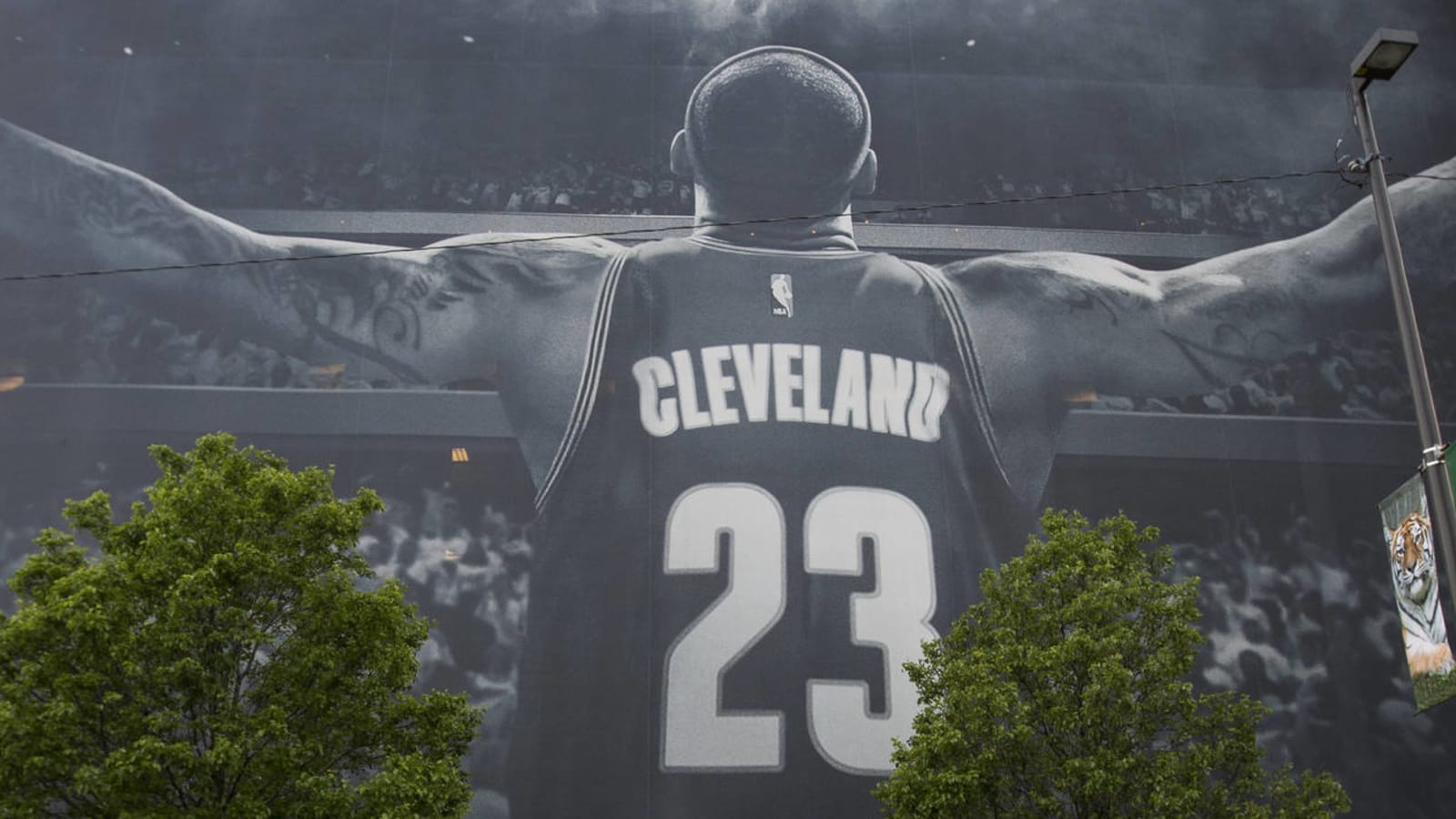
The signature athlete from North American cities
Visit any major city in North America, and chances are it has an athlete that it claims as its favorite. Sometimes the person hails from that city or sometimes just performed great feats for a local team. Either way, one athlete usually stands above the rest, no matter the town. Let's take a look at every major city's signature athlete and some of feats that earned that distinction.
ATLANTA: Chipper Jones
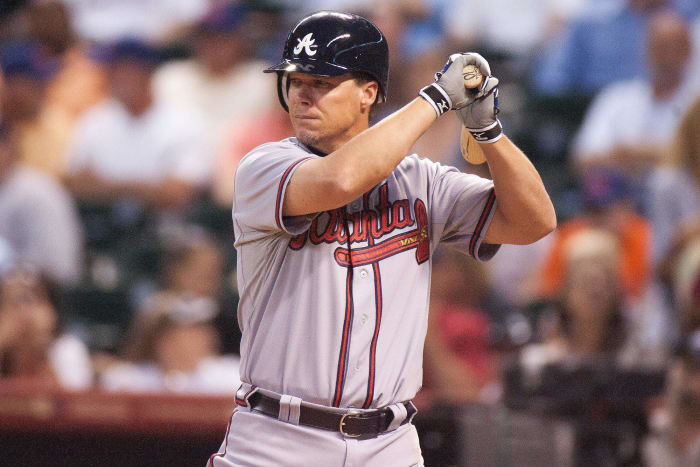
Jones spent all 19 years of his Hall of Fame career with the Braves and racked up some staggering numbers in the process. Jones hit .303 for his career, got on base at a .401 clip and was a major power threat from both sides of the plate, totaling 468 home runs, with a high of 45 in his 1999 MVP season. Jones was slightly more dangerous as a left-handed hitter, but that was likely a byproduct of repetition more than any actual weakness. He was an eight-time All-Star, the face of one of baseball’s most successful franchises for two decades, and he was one of the most dangerous switch-hitters the game has ever seen. If you were an opposing fan, you may have tried to throw him off by chanting “LAR-RY,” his given name, but chances are that only made him angry, and an angry Chipper Jones was a devastating force.
Apologies to: Deion Sanders, Dominique Wilkins, Michael Vick, Matt Ryan, Julio Jones, Dale Murphy
BALTIMORE: Cal Ripken Jr.
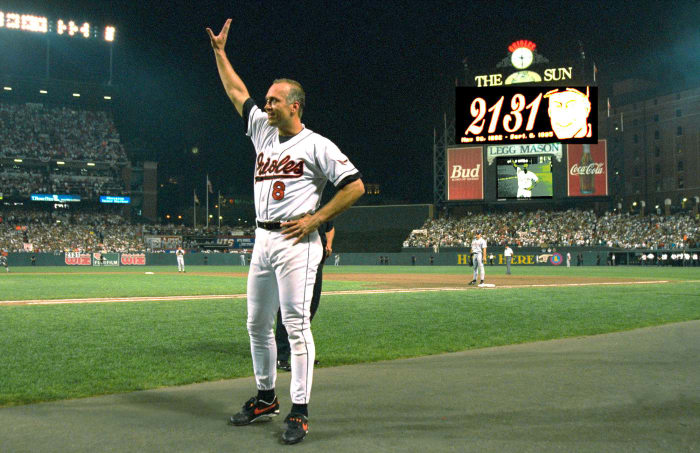
“Let it be said that No. 8, Cal Ripken Jr., has reached the unreachable star.” Those were Chris Berman’s words on Sept. 6, 1995, after the game between the California Angels and Baltimore Orioles became official after the top of the fifth inning ended. In that moment, Ripken had broken Lou Gehrig’s iron man streak by playing in his 2,131st consecutive game. The streak, which ended in 1998 at 2,632 games, was Ripken’s most famous achievement, but at times it unfairly overshadows what was a superb 21-year career, all with the Orioles. One of the first “big” shortstops, Ripken finished his career with 19 All-Star Game appearances, 3,184 hits, 431 home runs, AL Rookie of the Year in 1982 and MVP in 1983 and 1991. Add in the fact that Ripken was a native son, having been born in Havre de Grace, about 40 miles outside of Baltimore, and was raised in Aberdeen, some 25 miles away, and to this day resides in Annapolis, and you have a logical— if tough — choice for Baltimore’s signature athlete.
Apologies to: Johnny Unitas, Ray Lewis, Ed Reed, Eddie Murray, Jim Palmer, Lamar Jackson
BOSTON: Tom Brady
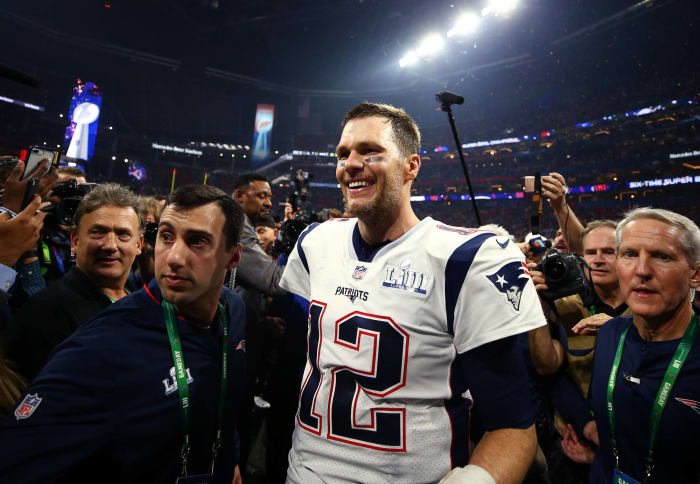
Brady has seven Super Bowl wins, Ten Super Bowl appearances, 13 trips to the AFC championship game, including eight in a row, an NFC title, three MVP Awards, 15 Pro Bowl nods, three First-Team All-Pro honors and also very clearly won the breakup with Bill Belichick. Brady's most impressive feat might be the fact that he turned Boston, a Red Sox town for the better part of a century, into Patriots country first and foremost. That’s what winning big year after year tends to do. Brady is the greatest winner the sport has ever seen, and for most, he’s the greatest quarterback and greatest player ever. His partnership with Belichick turned one of the league’s perpetually downtrodden franchises into its best, and it didn't even take the pair 20 years to do it. Boston has a rich sports history dating back well into the early 20th century, and there are literally a dozen athletes who could lay claim to the title of “signature athlete,” but there is one who deserves it more than anyone else, awkward split with the team aside, and his name is Tom Brady.
Apologies to: Bill Russell, Bobby Orr, Ted Williams, Larry Bird, David Ortiz, Carl Yastrzemski, Roger Clemens, Larry Bird, John Havlicek, Bob Cousy
BUFFALO: O.J. Simpson
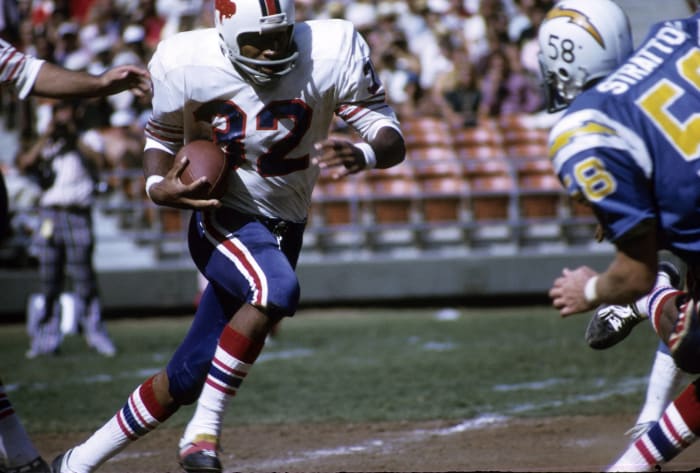
This is a reality Buffalonians wish was not true, given Simpson’s infamous life after football, but no athlete is tied more closely to the city than he. Simpson was the first running back to top 2,000 yards in a single season when he finished with 2,003 in 1973, and he remains the only one to accomplish the feat in 14 games. That season came in the midst of a five-year run that saw Simpson take home first-team All-Pro honors each season, and pile up 7,699 of his 11,236 career rushing yards. Simpson won the MVP Award that year, and despite the Bills of the early 1990s making it to four straight Super Bowls, no player on that team was able to outdo Simpson’s on-field accomplishments. In his day, few defenders were able to match Simpson’s combination of size, power and pure speed. He is widely regarded as one of the greatest running backs in league history.
Apologies to: Bob McAdoo, Bruce Smith, Jim Kelly, Thurman Thomas, Andre Reed, Dominik Hasek, Gilbert Perreault, Josh Allen
CALGARY: Jarome Iginla

The Flames are Calgary’s only team in the “major four” professional sports, and while many great players have passed through the franchise, Iginla trumps them all. He played 16 seasons for the Flames, and despite all of his prime occurring in the “dead puck” era, he still posted impressive point totals and won the Art Ross Trophy in the 2001-02 season. Iginla was the consummate captain, known as much for his leadership as his play, and while he never won a Stanley Cup, his fight with Lightning captain Vincent Lecavalier during Game 3 of the 2004 Stanley Cup Final is one of the sport's iconic moments of this century. Iginla possessed classic power forward size but also plenty of skill, and he was no stranger to dropping his gloves if need be. Though the last few seasons of his career were spent chasing a championship — a quest that went for naught — he is a deserving choice as Calgary’s signature athlete.
Apologies to: Al MacInnis, Theo Fleury, Joe Nieuwendyk
CHARLOTTE: Cam Newton

The Hornets have never had enough success, nor had a star stick around long enough, to claim a truly iconic athlete that the city embraced as its own. In Newton, though, the Panthers had a standard-bearer for the city and one of the NFL’s most unique, dynamic talents, with the personality to match. The top overall pick in the 2011 draft, Newton struggled his first few seasons before coming into his own in 2013, leading the Panthers to a 12-4 mark. He got even better in 2015, taking Carolina to a 15-1 record and winning the MVP Award in the process. Newton was a dazzling dual-threat quarterback during his time with the Panthers, and when he was at his best there, few in the league could match him. Beyond his skills on the field, Newton’s magnetic personality made him one of the league’s most marketable stars and one of its most popular with younger fans. Charlotte might not have an illustrious pro sports history, but most of the high points can be traced to Newton. It might have ended awkwardly in Carolina, but Newton is Charlotte's signature athlete.
Apologies to: Larry Johnson, Steve Smith, Kemba Walker, Julius Peppers
CHICAGO: Michael Jordan

Finally, an easy choice. Where would you like to start? Jordan’s six NBA championships? The fact that he and the Bulls might have won eight in a row had he not been out of basketball for a year and a half? His six Finals MVP Awards? Perhaps his 14 All-Star nods, five MVP Awards, 10 scoring titles, Rookie of the Year Award or maybe something else? Really, the numbers and accolades don’t do Jordan justice. He was the most famous, iconic athlete on the planet for a long time, and for many people, he still is. Any athlete in any sport who scores a fat endorsement contract can thank Jordan for blazing a trail. He is, at worst, the second-greatest player in NBA history; if you want to start an intense debate with any sports fan, just ask, “Jordan or LeBron?” Jordan carried the NBA from the Bird-Magic era of the early 1980s into global prominence in the 1990s and beyond, and his Jordan Brand line for Nike makes the company billions. On the court and off, few can come close to Jordan’s global appeal. The fact that he did virtually all of his work in Chicago, and single-handedly made it a Bulls town, makes him the obvious pick.
Apologies to: Ernie Banks, Mike Singletary, D. Butkus, Mike Ditka, Walter Payton, Gale Sayers, Frank Thomas, Scottie Pippen, Sammy Sosa, Bobby Hull, Patrick Kane, Jonathan Toews
CINCINNATI: Oscar Robertson

If Jim Brown was the archetype for the modern running back and athlete in the NFL, Robertson was the same for do-it-all positionless player in the modern NBA. In his 10 years playing for the Cincinnati Royals, Robertson averaged 29.3 points, 10.3 assists and 8.5 rebounds per game. He averaged a triple-double for the entire season his first two years in the league and came up half an assist per game short in his third season and one-tenth of a rebound per game short in his fourth. Robertson won the scoring title once, was the league’s leading assist man six times and won the MVP Award for the 1963-64 season. He also won Rookie of the Year in 1960-61, was an 11-time All-NBA performer and is widely regarded as a both a player before his time and one of the greatest basketball players in history. Oh, and before he dominated the NBA, he did the same at the University of Cincinnati. If you were looking for Pete Rose in this space, you came to the wrong place because while he wasn’t even the greatest player in Reds history, Robertson was a transcendent force.
Apologies to: Pete Rose, Johnny Bench, Joe Morgan, Frank Robinson, Anthony Munoz, Joe Burrow
CLEVELAND: LeBron James
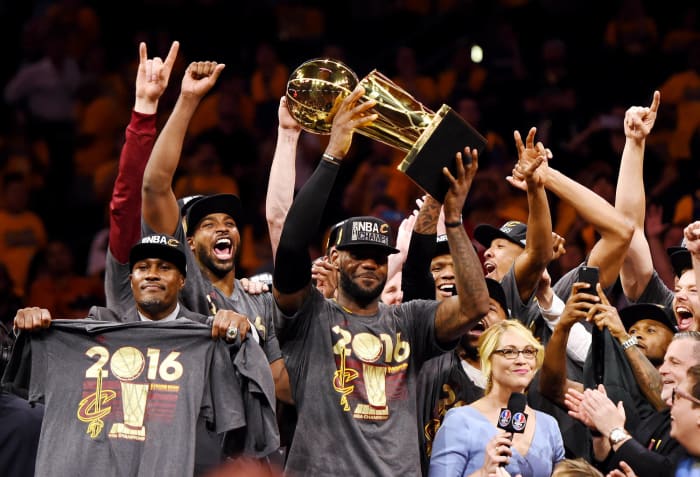
This one isn’t as cut-and-dried as it seems, as Jim Brown has a strong case, but James is the definition of a hometown hero, having starred at Akron’s St. Vincent-St. Mary High School before rescuing the Cavaliers from irrelevance. James was a pariah when he left the first time and a hero when he went back. His legend only grew when he delivered Cleveland its first championship in over 50 years with a thrilling 2016 NBA Finals win over the Warriors. James is Michael Jordan’s successor in every way, having arguably surpassed him on the court while quickly building a comparable business empire away from it. His second departure from Cleveland was not acrimonious, owing to the title and the realization by most Cavs fans that owner Dan Gilbert was the franchise’s real issue. James may go down in history as the best basketball player ever, is the NBA's all-time leading scorer, its active career rebounds leader, is fourth or third (depending on the day - thanks Chris Paul) all time in assists, and he almost single-handedly vanquished all the torment from one of America’s perpetually hard-luck sports towns. Cleveland has had some truly great athletes pass through, but James’ continuing impact on the city is singular.
Apologies to: Jim Brown, Bob Feller, Jim Thome, Joe Thomas
COLUMBUS: Jack Nicklaus

The Golden Bear still stands alone as the best golfer of all time, and his record of 18 major championships still seems safe. Nicklaus grew up in Upper Arlington, a Columbus suburb, and starred at Ohio State. He won the U.S. Amateur twice while in college, and after winning the 1962 U.S. Open he was the reigning U.S. Open and U.S. Amateur champion. Nicklaus expanded his empire into golf course design and also runs his own event, the Memorial Tournament, which is among the biggest non-major events on the PGA Tour calendar, regularly boasting one of the year’s strongest fields. Memorably, Nicklaus thrilled crowds at Augusta National in 1986 when he fired a final-round 65, including a 30 on the back nine, to come from behind and win the Masters at 46 years old. He remains the oldest-ever winner of the Masters and the third-oldest major winner ever, after Julius Boros and Phil Mickelson.
Apologies to: Archie Griffin, Eddie George, Buster Douglas
DALLAS: Emmitt Smith

Smith is the NFL’s all-time leading rusher and all-time leader in rushing touchdowns. He led the league in rushing four times, including three years in a row from 1991-1993, and led the league in touchdowns three separate times. Despite his statistical excellence, Smith is rarely mentioned in the discussion of the NFL’s best all-time running backs, as most experts feel that he was at least to some degree a byproduct of Dallas’ dominant offensive line. Even if that’s a little bit true, Smith’s resume is still staggering. His running style was not flashy, but he was one of the toughest pound-for-pound players in the league. His 1993 alone is a legendary year, as he became the only running back ever to win the MVP Award, the rushing title, a Super Bowl, and the Super Bowl MVP Award. Smith was the engine of the Cowboys’ early 1990s dynasty, and while he doesn’t stir the imagination like other stars, no Dallas athlete was more accomplished.
Apologies to: Roger Staubach, Tony Dorsett, Troy Aikman, Michael Irvin, Jason Witten, Dirk Nowitzki, Ivan Rodriguez
DENVER: John Elway
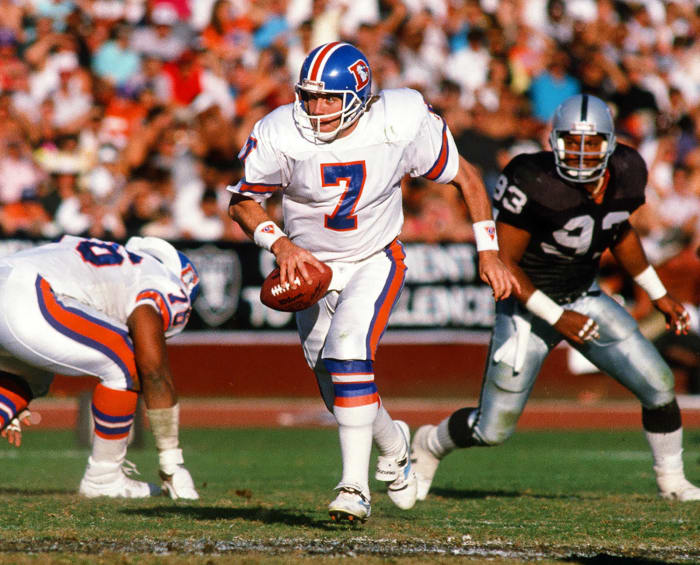
An easy choice here. Elway spent his entire 16-year career with the Broncos, and while a perusal of his numbers, especially early in his career, would leave a modern fan underwhelmed, there were few players more naturally gifted and with a better knack for big plays at key moments. Elway authored 31 regular-season, fourth-quarter comebacks during his career and four more during the playoffs. Most notable among these was “The Drive,” a seminal moment in Elway’s career. Taking over at the 2-yard line in the 1986 AFC championship game, Elway overcame the Browns and a hostile Cleveland crowd to march the Broncos 98 yards in just over five minutes for a game-tying score with 37 seconds remaining and then engineered the game-winning drive in overtime. Elway couldn’t get over the hump for a Super Bowl victory until 1997 when Terrell Davis gave him the running threat he had lacked for so long. Elway led Denver to an upset of the favored Packers in Super Bowl XXXII. Elway went out on top the following season, winning Super Bowl XXXIII and taking home MVP honors for the game, then retiring. Elway is unquestionably one of the best quarterbacks in league history.
Apologies to: Joe Sakic, Peter Forsberg, Todd Helton, Dan Issel, Terrell Davis, Steve Atwater, Champ Bailey, Rod Smith, Nikola Jokic
DETROIT: Gordie Howe

One of the toughest choices of them all. There’s Barry Sanders, Ty Cobb, Nicklas Lidstrom, Isiah Thomas, Steve Yzerman and Al Kaline, just to name a few. Any of them would be worthy of being called Detroit’s signature athlete. But for a city that calls itself “Hockeytown,” the man it called “Mr. Hockey” has to be the choice. Howe played 25 seasons, spanning four different decades, for the Red Wings. He won six Hart Trophies, six Art Ross Trophies, four Stanley Cups, and was an All-Star 21 times. Oh, and at age 40, in his 23rd season with the Red Wings, Howe piled up a career-high 103 points. Howe was hockey’s first superstar, was not afraid to drop the gloves if the need arose and was synonymous with the sport not only in Detroit but also all over North America. There aren’t many cities in the United States where hockey stands on equal or greater footing with football, baseball and basketball, but Detroit is one of them. It’s only fitting that the city’s signature athlete be the hockey player fans loved the most.
Apologies to: Barry Sanders, Ty Cobb, Nicklas Lidstrom, Isiah Thomas, Steve Yzerman, Al Kaline, Calvin Johnson
EDMONTON: Wayne Gretzky

If Detroit was an extremely tough decision, Edmonton is at the other end of the spectrum. It’s Wayne Gretzky and everyone else. The Great One played nine seasons for the Oilers, and his 1,669 points in that time would rank ninth in NHL history had his career ended immediately thereafter. The Oilers won four Stanley Cups during Gretzky’s time with the franchise, with all four coming in a five-year span. Gretzky topped 200 points in a season four times with Edmonton and led the league in assists every year he played for the Oilers. Gretzky put up numbers with the Oilers that will never be matched unless the league dramatically alters the rules, and despite his modest size and lack of a standout physical trait, he was a singular force in the league. The Oilers of the 1980s were one of the most talented franchises in hockey history, with multiple Hall of Famers skating alongside Gretzky, but it is a testament to his primacy that none of those players comes close to his legacy in the city.
Apologies to: Mark Messier, Jari Kurri, Grant Fuhr, Paul Coffey, Connor McDavid
GREEN BAY: Brett Favre

With apologies to other Packers standouts through the years, this was a three-horse race between Favre, Bart Starr and Aaron Rodgers. Favre gets the nod despite his awkward split from the team, and Rodgers, by virtue of his spectacular early-career run, one that yielded an MVP three-peat from 1995-1997, a Super Bowl title in 1996 and iconic status as perhaps the sport’s quintessential gunslinger. What made Favre special wasn’t just the numbers he posted but the way he went about it, often making several risky, hold-your-breath throws per game, but usually coming out on top thanks to his spectacular arm strength. Favre also played the game with an unrestrained, authentic joy rarely seen at the highest level and was the man most responsible for ending the Cowboys’ early and mid-1990s run of dominance. Oh, and there was the 297-game ironman streak, the majority of which came with the Packers and is almost unthinkable given the nature of football. Starr is iconic, and Rodgers almost certainly the most naturally gifted of the three, but Favre had a quality about him that made fans gravitate toward him and revere him as almost larger than life.
Apologies to: Bart Starr, Aaron Rodgers, Ray Nitschke, Don Hutson
HOUSTON: Earl Campbell

Football is more religion than sport in Texas, and toughness is particularly valued. An argument can be made that no player in NFL history was tougher and more physical than Campbell. The Texas star and 1977 Heisman Trophy winner went No. 1 overall in 1978 and did not disappoint. He led the NFL in rushing, was named NFL Offensive Player of the Year in each of his first three seasons and took home the 1979 MVP Award. His 1980 campaign was even better, as he finished with 1,934 yards rushing and a 5.2 yards per carry average. Campbell topped 1,300 yards in all but one of his first six seasons, and the outlier was 1982, a year cut short to nine games by a players strike. Campbell was a first-team All-Pro three times, and a Pro Bowler five times, but the stats don’t tell his full story. Highlights of hapless defenders hanging onto his jersey for dear life while he took on their teammates with violent abandon are Campbell’s legacy. His career lasted less than a decade, but he made a massive impact literally and figuratively, cementing himself as one of the best power backs of all time and an iconic figure within the sport. Campbell was enshrined in the Hall of Fame in 1991.
Apologies to: J.J. Watt, Nolan Ryan, Craig Biggio, Jeff Bagwell, Hakeem Olajuwon, Lance Berkman, Yao Ming
INDIANAPOLIS: Peyton Manning

The Colts were a moribund team in 1997, going 3-13, but that miserable record was a blessing because it gave them the first pick in the 1998 NFL Draft, and with it the chance to draft Tennessee’s Peyton Manning. Manning immediately became the starter, and while he suffered through a rough first season, throwing 28 interceptions against 26 touchdowns, he turned things around swiftly, piloting Indy to a 13-3 mark in 1999. Manning was a four-time MVP with the Colts, five-time first-team All-Pro in Indianapolis and won the Super Bowl in 2006. Manning threw for 54,828 yards and 399 touchdowns as Colts quarterback and posted a 141-67 regular-season record. He is widely regarded as one of the best players in football history and almost single-handedly resurrected a franchise that had not had a 10-win season for 20 years prior to his arrival. Manning’s 121.1 passer rating in 2004 is the second-highest single-season mark in league history, trailing only Aaron Rodgers’ 122.5 in 2011. It can be fairly stated that few players in any sport have done as much to change the fortunes of one franchise as Manning did for the Colts.
Apologies to: Andrew Luck, Reggie Miller, Marvin Harrison, Edgerrin James
KANSAS CITY: Patrick Mahomes

This was originally George Brett's place. I even noted that those expecting to see Patrick Mahomes would have to wait. Well, they've waited long enough. Is this a good enough resume to overtake Brett? Two Super Bowl titles, two Super Bowl MVPs, two MVPs, two first-team All-Pro nods, six straight AFC Championship Game appearances - which encompasses every year he's been the Chiefs' starter - and enough highlights to fill hours of air time. Mahomes would be an easy Hall of Famer if he retired today, but much to the chagrin of the rest of the NFL, he won't be 29 until the start of next season, at which point he might have added to those accolades above. Sorry, George.
Apologies to: George Brett, Len Dawson, Derrick Thomas, Priest Holmes, Willie Lanier, Tony Gonzalez, Travis Kelce
LAS VEGAS: Marc-Andre Fleury

Easy choice here, as Fleury and the expansion Golden Knights were the talk of hockey and the sports world at large in 2017. Fleury, the longtime Penguins goalie, went to Vegas via trade and immediately became the face of the city’s first major four professional sports franchise. It helped that he also had a career year in Vegas’ inaugural season, posting a career-best .927 save percentage in the regular season and then leading the Golden Knights on a stunning march through the Western Conference playoffs, one that earned them a date in the Stanley Cup Final against Washington. Though the Capitals prevailed in five games, Fleury’s save percentage in the postseason was identical to the regular season, .927, and he led the NHL with four playoff shutouts. The Golden Knights returned to the playoffs in 2018, and though Fleury’s numbers weren’t as strong, they were still good. He only spent four years in Vegas, but his impact on its sporting consciousness will last much longer.
Apologies to: Jon Marchessault, William Karlsson, Josh Jacobs, Maxx Crosby
LOS ANGELES: Magic Johnson
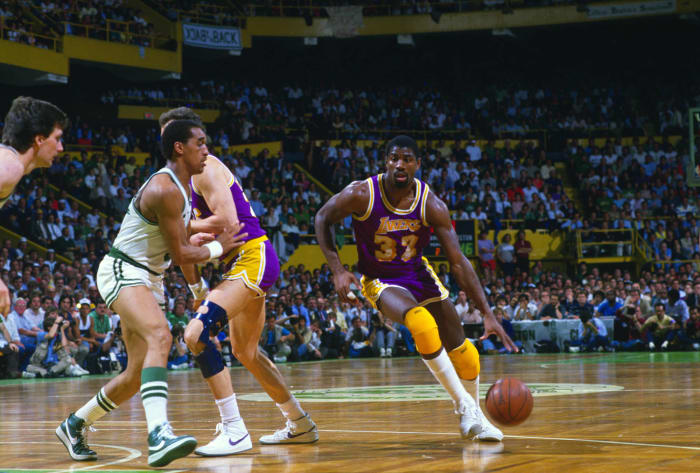
There are many deserving candidates here, but no athlete is more inextricably tied to the city than Magic Johnson. Johnson’s arrival on the Lakers turned them from a talented team that fizzled in the playoffs into a near-unstoppable force. Prior to his abrupt retirement after the 1990-91 season, Johnson’s Lakers won five NBA titles, went to the NBA Finals four more times and were eliminated prior to the Western Conference Finals only twice. Johnson’s creativity in the open court and precision passing turned Los Angeles into the “Showtime” Lakers, as they became known for going up and down the court and often finishing fast breaks with dunks or nifty no-look passes. The Lakers-Boston Celtics rivalry carried the NBA through the majority of the 1980s, and Johnson was at the center of everything. He was a three-time NBA MVP, a three-time Finals MVP, four-time league assist champion and 12-time All-Star. His first tenure with the Lakers yielded career averages of 19.7 points, 11.4 assists, 7.3 rebounds and 1.9 steals per game. Johnson is recognized as one of the most unique, versatile talents the game has ever seen, and his post-playing career has made him into even more of a fixture in Los Angeles.
Apologies to: Kobe Bryant, Shaquille O’Neal, Kareem Abdul-Jabbar, Jerry West, Elgin Baylor, Mike Trout, Clayton Kershaw, Jack Youngblood, Merlin Olsen, Shohei Ohtani
LOUISVILLE: Muhammad Ali

No contest here, as the ‘Ville doesn’t have any major four professional teams, and even if it did, no athlete could eclipse the city’s favorite son. Ali’s legacy in the boxing ring, where he was unanimously viewed as one of the greatest fighters ever, is matched only by his stature away from it. His 1966 refusal to be drafted due to his religious beliefs and his opposition to the Vietnam War made him a divisive figure and resulted in his arrest for draft evasion as well as his being banned from boxing. Despite the Supreme Court overturning his conviction in 1971, he was robbed of several years of his prime. Still, Ali was involved in some of the most memorable fights in the sport’s history, and because boxing was still a major draw in the 1960s and 1970s, he was arguably the most famous athlete on the planet. He twice defeated Sonny Liston, with both fights shrouded in controversy to this day. His trilogy with Joe Frazier, culminating in the “Thrilla in Manila,” represented one of the most bitter individual rivalries in sports history, and his “Rumble in the Jungle” upset of George Foreman is viewed to this day as an all-time classic sporting event. Ali was one of the most charismatic athletes who ever lived, and his trash talking, while it occasionally crossed a line, particularly with Frazier, was instrumental to his legacy. Ali’s nickname was, “The Greatest,” and few monikers have ever been more fitting.
Apologies to: none
MEMPHIS: Mike Conley

The Grizzlies haven’t even been in Memphis for 20 years, but they have carved out a reputation as one of the NBA’s grittiest teams. Conley was a big reason for that, as his gritty all-around game helped define the team for years. The fourth-overall pick in the 2007 NBA Draft, Conley played 12 seasons with the Grizzlies and posted averages of 14.9 points, 5.7 assists, three rebounds and 1.5 steals per game for his career. He, along with Zach Randolph and Marc Gasol, formed the nucleus of a Grizzlies team that never got to the top of the mountain but earned respect for being a reliably tough out in the playoffs. Conley was never an elite shooter but was a good enough pure scorer to function as either a primary offensive option or facilitator depending on the opponent and what the rest of the Grizz were doing. Though he's since moved on to Utah, and now Minnesota, Conley remains the franchise’s defining player during its Memphis tenure.
Apologies to: Marc Gasol, Zach Randolph
MIAMI: Dwyane Wade

Not many athletes, particularly in the NBA, can be a teammate of LeBron James yet be viewed as an equal, but that’s exactly what Wade was during their time together. Part of that has to do with the fact that Wade was already an NBA champion when James got to town. Wade became such an integral part of the fabric of Miami that it was jarring and incongruous to see him play a season for the Chicago Bulls despite Chicago being his hometown. Aside from that year-and-a-half season in Cleveland alongside James, Wade spent his whole career with the Heat. He was one of the greatest shooting guards of all time despite never being a particularly gifted long-range marksman. Wade attacked the rim like few other guards his size and was an elite finisher in the paint despite absorbing so much hard contact that highlights featuring Wade crashing to the ground became part of a marketing campaign. Wade wasn’t the best player to ever suit up for the Heat — that would be James — but he was unquestionably the most beloved. Given Miami’s tortured recent history in football and acrimonious relationship with the Marlins, that makes him a logical, if not slam dunk, choice as the city’s signature athlete.
Apologies to: Dan Marino, Larry Csonka, Giancarlo Stanton, Jose Fernandez, Jeff Conine, Jason Taylor
MILWAUKEE: Hank Aaron

Though Aaron’s crowning achievement — his breaking of Babe Ruth’s career home run record — came when the Braves were based in Atlanta, the majority of his baseball career took place in Milwaukee. Aaron played 12 seasons with the Milwaukee Braves and then two with the Milwaukee Brewers to finish up his career. He hit 398 home runs during his first stint in Milwaukee and won the only MVP Award of his career there in 1957, the same year the Braves won the World Series. In total, 420 of his career 755 home runs were hit as a member of a Milwaukee franchise. Aaron won two batting titles while playing in Milwaukee, was twice the National League’s home run champion there and also led the league in hits on two separate occasions. Aaron won three Gold Gloves and represented Milwaukee at 12 All-Star games. He failed to hit .300 only twice in 12 seasons as a member of the Milwaukee Braves, and he led the league in RBI three times in that same span. Aaron is baseball’s career RBI leader, is still seen by many as the rightful all-time home run king and is still in some ways one of the most underrated all-time greats in any sport. Some other fantastic athletes have made their marks on Milwaukee, but none has done it like Hammerin’ Hank.
Apologies to: Kareem Abdul-Jabbar, Robin Yount, Eddie Mathews, Warren Spahn, Prince Fielder, Ryan Braun
MINNEAPOLIS: Fran Tarkenton

Minneapolis presents a conundrum, as the Vikings, Timberwolves and Twins all have athletes who have a valid argument for being the city’s signature star. Tarkenton gets the nod over a strong and varied field in part because of the way he played the position. Tarkenton scrambled around like few other passers of his day, took risks and was just as likely to commit a turnover as he was to make a spectacular play. He had two separate stints with the Vikings, totaling 13 years, with five years quarterbacking the New York Giants in the middle. Tarkenton arguably got better with age, as he was the NFL MVP in 1975 at the age of 35, leading the Vikings to a 12-2 record. Tarkenton was a five-time Pro Bowler with Minnesota, and he threw 239 touchdown passes while compiling a 91-73-6 career record as the Vikings QB. Tarkenton logged 2,548 yards rushing during his time with Minnesota and scored 22 touchdowns on the ground. One of the only blemishes on Tarkenton’s resume is his 0-3 record in the Super Bowl, but the Vikings as a team had a bad habit of making it to the big game only to fall short time and again. Minnesota has had other sports heroes, including ones who helped bring a title or two to town, but Tarkenton, inducted into the Hall of Fame in 1986, stands above the rest.
Apologies to: Kevin Garnett, Cris Carter, Kirby Puckett, Randy Moss, Alan Page, Carl Eller, Harmon Killebrew, Rod Carew, Jim Marshall
MONTREAL: Jean Beliveau

Any discussion of Montreal’s signature athlete boils down to choosing between various Canadiens legends. Maurice Richard has a trophy named after him, Guy Lafleur had a monster run of staggering production in the 1970s, and Patrick Roy, Jacques Plante, Ken Dryden and Carey Price are all marvelous goalies. The pick, however, is Jean Beliveau. Beliveau was the Habs captain for a decade, was a 10-time All-Star, 10-time Stanley Cup champion, and won two Hart Trophies and a Conn Smythe as well. Beliveau won the Art Ross Trophy in 1955-56, and piled up 1,219 points in a 20-year career, spent entirely with the Canadiens. Montreal’s historical dominance in hockey and plethora of Hall of Famers makes it tough to choose; unlike the Yankees and Babe Ruth, there isn’t a clear-cut best-ever player in franchise history. In fact, Larry Robinson has a case as that for Montreal, but he doesn’t have the same sort of cachet as Beliveau, Richard and the rest. Ten years as a captain, membership in the 500-goal club and ten Cups is good enough for me. Canadiens fans, feel free to tell me how I got this one wrong.
Apologies to: Maurice Richard, Guy Lafleur, Jacques Plante, Ken Dryden, Carey Price, Patrick Roy, Vladimir Guerrero, Gary Carter
NASHVILLE: Steve McNair
McNair was a legend during his collegiate career at Alcorn State, and while it was surprising to some that he went third overall in the 1995 NFL Draft, he more than lived up to the hype, compiling a 76-55 record in 11 seasons with the Oilers/Titans, including a 72-53 mark in Nashville. McNair was the 2003 NFL MVP, and one of the few dual-threat quarterbacks who was more of a power runner than a speed merchant. McNair gamely led the Titans to the 1999 Super Bowl against the high-powered Rams, and nearly led Tennessee all the way back from a 16-0 deficit, famously coming up a yard short of the tying score with his slant pass to Kevin Dyson on the game’s final play. McNair and Eddie George were the engines, respectively, of a blood and guts Titans offense that grappled with the Ravens for AFC supremacy just before the turn of the century. From 1999-2003, McNair guided the Titans to a 49-22 record, and posted the best statistics of his career, with 94 touchdowns through the air, to go along with 1,732 yards rushing and 20 touchdowns on the ground. He battled through plenty of injuries, and was one of the toughest quarterbacks in history.
Apologies to: Eddie George, Pekka Rinne, Shea Weber
NEW ORLEANS: Drew Brees

All Brees did after signing with the Saints in 2006 was put up video game numbers year after year, and deliver the city of New Orleans a championship in 2009. A rundown of Brees’ accolades and statistical records is probably the best way to do justice to his career, one that helped shred the notion that shorter quarterbacks can’t succeed in the NFL. Brees is second all time in passing yards, second all time in passing touchdowns, boasts the sixth-highest career passer rating of all-time, has led the NFL in passing yardage seven times, has the second-highest single-season passing yardage total in history—with his 5,476 in 2011 trailing Manning’s 2013 output by a single yard, and has led the league in touchdown passes four separate times. Brees got better with age, as he led the NFL in passer rating in 2018, posting a 115.7 mark at age 39, while taking the Saints to the NFC Championship Game, only to be robbed of a chance at a second Super Bowl title by one of the most egregious missed calls in NFL history. Brees has also been a fixture in the New Orleans community, a particularly relevant note given the way the region suffered after Hurricane Katrina. There are other great athletes that have played in the Big Easy, but Brees is an easy pick.
Apologies to: Anthony Davis, Pete Maravich, Rickey Jackson, Archie Manning
NEW YORK: Babe Ruth
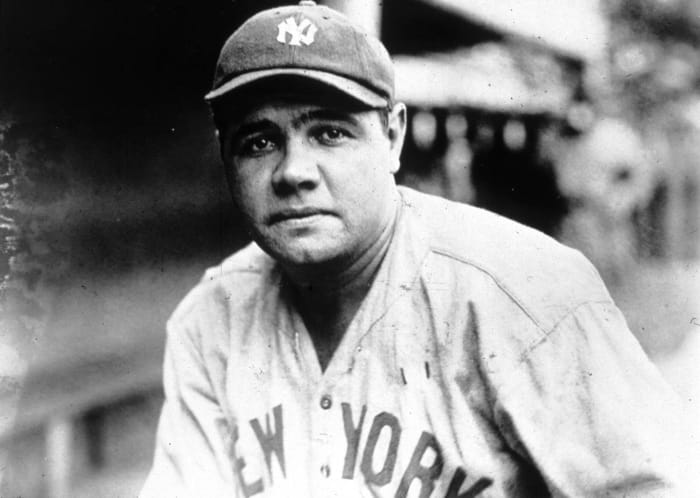
You would think that picking a signature athlete for the city would be difficult. Spoiler alert: it was not. New York is a Yankees town first, so the answer is easy. Ruth might be the greatest baseball player ever. He was certainly the greatest of his time. He was the 1923 AL MVP, and but for an American League rule in existence until 1930 that deemed previous winners of the award ineligible for future consideration, he would have won several more. Ruth led the AL in home runs 12 times, runs eight times, RBI five times, walks 11 times, threw in a batting title for good measure, and that doesn’t even get to the true measure of his dominance. From 1919 through 1934, Ruth finished with an OPS below 1.100 only three times. He is baseball’s all-time leader in both slugging percentage and OPS, held the single-season and all-time home run crowns for decades, and brought the league out of the dead ball era with tape measure homers and legendary feats like his alleged called shot off of Charlie Root, feats that are more fun to believe than they are to poke holes in. New York has seen countless truly great athletes, but none come particularly close to the Sultan of Swat.
Apologies to: Lou Gehrig, Mickey Mantle, Joe DiMaggio, Mariano Rivera, Willis Reed, Patrick Ewing, Tom Seaver, Joe Namath, Curtis Martin, Lawrence Taylor, Michael Strahan, Eli Manning, Henrik Lundqvist, nearly 30 or so other greats
OAKLAND: Stephen Curry

Some might chalk this up to recency bias, with Curry currently one of the most famous athletes on the planet, but while Oakland has been home to many iconic stars, Curry stands above the rest. It isn’t just his production, or the Warriors’ metamorphosis into a dynasty in large part because of his greatness, it’s the aesthetic appeal of his play. His range is unlimited, and he regularly turns the preposterous into pedestrian. No opponent’s lead is safe as long as Curry is on the court, and once he crosses half court, he is a threat to pull up from anywhere, and must be defended as such. Curry is the best pure shooter in history, and if someone cares to argue that point, good luck. Curry’s 272 made three-pointers in 2012-13 set a single-season NBA record, besting Dennis Scott’s 267 from 1995-96. Curry then went on to revolutionize the game, obliterating the record in subsequent seasons, topping out at 402 made treys in 2015-16. In all, Curry led the league in three-pointers five straight seasons, did it again two more times and is currently leading the league as of this writing, and his transcendence changed the way the game was played. Curry is a two-time MVP, four-time NBA champ, nine-time All-Star, and two-time scoring champ.
Apologies to: Rickey Henderson, Ken Stabler, Rick Barry, Reggie Jackson, Tim Brown, Fred Biletnikoff
OKLAHOMA CITY: Russell Westbrook

The Thunder are Oklahoma City’s only major four pro team, but some venerable names have passed through in the franchise’s brief existence, namely Kevin Durant and James Harden. Neither of those men is Russell Westbrook, who is the city’s signature athlete. Westbrook, despite bouncing around the league the last several years, was the Thunder’s stalwart. He led the league in scoring twice, assists per game three times, and averaged a triple-double for the season three consecutive years. He was also the 2017 NBA MVP. Westbrook and Oscar Robertson are the only players in league history to average a triple-double for an entire season. There was something weirdly noble about watching Westbrook try to will the Thunder to the top of the Western Conference while the rest of the team disintegrated around him. He is at times rightly criticized for filling box scores with some empty statistics, and for being a less efficient player in later seasons. Still, despite Durant being the better player during his time in the city, Westbrook is OKC’s signature athlete.
Apologies to: Kevin Durant, James Harden
ORLANDO: Dwight Howard

The Magic are only major four pro team in Orlando, and they therefore account for a disproportionate amount of the city’s most notable athletes. The Magic have only been around since 1989, but they have had some of the most dominant and hyped stars in the league come through town. None made a bigger impact on the team than Dwight Howard. The Magic improved by 15 wins in Howard’s first season, and by his third, were a playoff team. Two years after that, they beat LeBron James and the Cavaliers on their way to an NBA Finals appearance. Howard was the engine for all of this, averaging 18.4 points and 13 rebounds per game for his eight seasons with the club. Despite never really refining an offensive game, Howard was so physically dominant that opposing defenses didn’t have many options when trying to stop him. Howard led the league in rebounds four times while in Orlando, and also was the league’s best shot-blocker for two straight seasons.
Apologies to: Shaquille O’Neal, Anfernee Hardaway, Tracy McGrady
OTTAWA: Daniel Alfredsson

Alfredsson might not be the best player in Senators history, as that honor could easily go to Erik Karlsson, but no player has meant more to the city or been more closely associated with it. Aside from one year in Detroit to wrap up his career, Alfredsson spent his entire playing time with the Senators. He is Ottawa’s all-time leader in both goals and points and was the team’s captain for 13 seasons. Perhaps the greatest measure of Alfredsson’s worth to the franchise was the sense of legitimacy he brought to it. Ottawa was atrocious in the years preceding Alfredsson’s arrival, winning 10, 14 and nine games in their first three years (the nine-win campaign coming in a 48-game season), respectively, in the league. He scored 61 points and won the Calder Trophy in 1995-96, and though the team improved to only 18 wins, better things were on the horizon. The Sens won 31 games and made the playoffs the following season and then had their first winning year in 1997-98. From 1996-97 through Alfredsson’s final season, 2012-13, Ottawa missed the playoffs only twice and made it to the postseason 11 straight years at one point. Many expansion franchises struggle, and it usually takes a cornerstone player emerging to change that reality. Alfredsson was that and then some for the Senators and is a worthy choice as Ottawa’s signature athlete.
Apologies to: Erik Karlsson, Craig Anderson, Jason Spezza
PHILADELPHIA: Mike Schmidt

The City of Brotherly Love might have an ugly, possibly overstated reputation when it comes to boorish fan behavior, but there is no denying that it has a rich and varied history when it comes to great athletes. Philly is one of the few cities where each of the four teams in town has a rabid following. There is no weak link in the bunch, and that holds true when trying to determine a signature athlete. However, one man rises above the rest, and that man is Mike Schmidt. The three-time MVP and 10-time Gold Glove winner spent his entire 18-year career with the Phils, racking up 548 home runs, leading the majors in home runs six times and the National League eight times, and he added in a World Series MVP in 1980, to boot. Schmidt was the game’s most feared power hitter for much of his career, and that, combined with his outstanding defense, puts him on the short list in the “greatest third baseman of all time” discussion. Schmidt led the NL in RBI five separate times and topped 100 nine separate times. He also led the NL in walks on four occasions. This is one of the toughest races to call, and there are at least a half-dozen other athletes with a claim to signature status, but Schmidt’s credentials carry the most weight.
Apologies to: Julius Erving, Wilt Chamberlain, Reggie White, Donovan McNabb, Brian Dawkins, Bobby Clarke, Bernie Parent, Allen Iverson, Steve Carlton
PHOENIX: Larry Fitzgerald

Tough call here, as Fitzgerald’s longevity, surefire Hall of Fame status and reputation as both one of the best wide receivers ever, as well as one of sports’ nicest guys narrowly trumps Randy Johnson’s four straight Cy Young Awards and 2001 World Series title. Johnson bounced around from place to place in his career, but Fitzgerald was a Cardinal for life. He has twice led the league in receptions, twice led it in touchdowns and racked up 17,492 receiving yards despite inconsistent quarterbacking. Fitzgerald had only one first-team All-Pro season, but he has 11 Pro Bowl nods, ranks second all time in receptions, second all time in receiving yards and sixth all time in receiving touchdowns. Had he played his entire career with, say Kurt Warner, instead of only a few seasons, he might be tops in just about all of those categories. That makes his career the rare one that is both great for what it was and also a classic “what if” case. Johnson’s actual statistical performance was better, relatively speaking, but sometimes, there is more to being a signature athlete than just raw numbers. Fitzgerald is Phoenix, more than any athlete to call the city home.
Apologies to: Randy Johnson, Steve Nash, Aeneas Williams, Charles Barkley, Shane Doan, Paul Goldschmidt, Curt Schilling
PITTSBURGH: Mario Lemieux
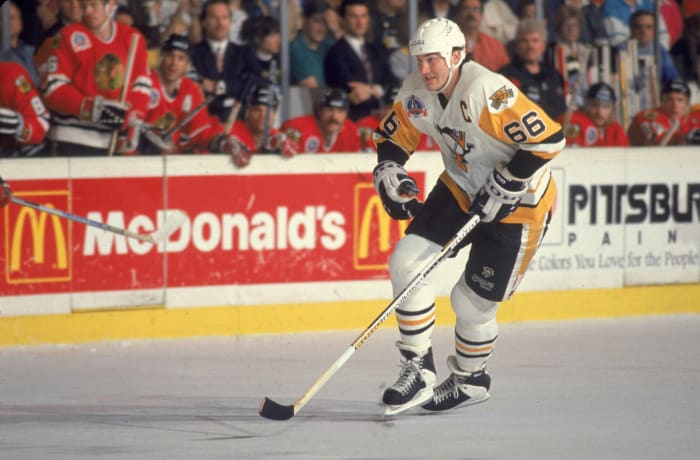
The City of Champions presents a unique quandary: Each of its three professional teams has at least one iconic superstar, and in some cases there are several. Each team has also gone through ebbs and flows of popularity, though Pittsburgh has ultimately been a Steelers town since the 1970s. However, only one athlete has saved a franchise twice and in two different ways. Mario Lemieux, the first overall pick in the 1984 NHL Entry Draft, was the most physically gifted hockey player ever. Despite dealing with persistent back injuries as well as Hodgkin’s lymphoma, Lemieux dominated opponents effortlessly. He retired in 1997, was immediately inducted into the Hockey Hall of Fame without the usual three-year waiting period, then came out of retirement in 2000 and piled up 76 points in 43 games. Lemieux has the eighth-most points in NHL history despite playing in only 915 games. Every other member of the top-10 played in at least 1,282 games. He has the second-highest goals per game average in league history, the second-highest assists per game average and the second-highest points per game average. He won three Hart Trophies, Six Art Ross Trophies,and two Conn Smythe Trophies. Oh, and Lemieux saved the Penguins off the ice by buying them out of bankruptcy and keeping them in Pittsburgh. That seems like a nice resume for Pittsburgh’s signature athlete, doesn’t it?
Apologies to: Joe Greene, Franco Harris, Terry Bradshaw, Roberto Clemente, Sidney Crosby, Jack Lambert, Willie Stargell, Ben Roethlisberger
PORTLAND: Clyde Drexler

Clyde the Glide might have been the NBA’s signature shooting guard but for the presence of some guy named Michael Jordan. Drexler was a do-it-all star for the Trail Blazers, particularly in the late 1980s and early 1990s. He averaged 20.8 points, 5.6 assists and 6.1 rebounds per game and was one of the league’s best athletes and high-flyers. In many ways, he was Michael Jordan lite, and Jordan got the best of him when the Bulls and Trail Blazers met in the 1992 NBA Finals. Drexler never won a title with the Trail Blazers, but he did go to the All-Star Game eight times as a member of the Blazers, and along with Terry Porter, helped them advance to the NBA Finals in 1990 and 1992. Portland’s run atop the Western Conference was brief, but it did serve as a buffer between the Lakers’ run in the 1980s and the mid-to-late 1990s dominance of the Rockets and Spurs. Had Jordan not been in the league, there is a chance Drexler might have ascended to become one of its signature stars, but he was a Hall of Famer in his own right, having been inducted in 2004. Drexler was also a member of the 1992 Dream Team.
Apologies to: Damian Lillard, Terry Porter, LaMarcus Aldridge, Rasheed Wallace
RALEIGH: David Thompson
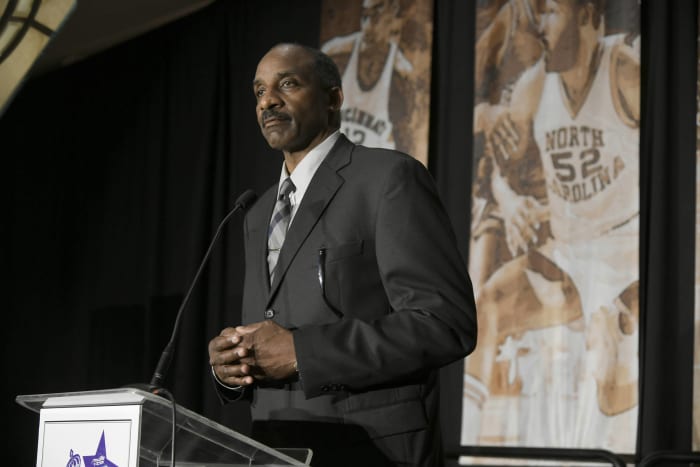
Thompson was one of the greatest college basketball players ever and one of the sport’s great pure athletes. Thompson’s collegiate career at North Carolina State coincided with the existence of the NCAA’s “Lew Alcindor” rule, which outlawed dunking. This robbed fans of likely a few hundred highlights, as Thompson’s vertical leap was among the greatest the game has ever seen. Thompson and a teammate also pioneered the alley-oop pass to take advantage of his leaping ability, albeit with a layup instead of a dunk at the end. The Wolfpack were banned from the postseason in 1973 but went 27-0 and then followed that up with a 30-1 season and an NCAA Championship the following year. Thompson averaged 24.7, 26 and 29.9 points per game in his three seasons at NC State, and despite being only 6-feet-4, also averaged around eight rebounds per game for his career. Thompson is routinely mentioned alongside Michael Jordan, Len Bias, Tim Duncan and others as one of the best basketball players in ACC history, and his 44 is to this day the only number the school has retired for men’s basketball.
Apologies to: Cam Ward, Eric Staal, Ron Francis, Lorenzo Charles, Mario Williams
SACRAMENTO: Chris Webber
The early-2000s Kings were one of the most fun-to-watch teams in recent NBA history, and they were also a breath of fresh air for a league still searching for a post-Michael Jordan identity while also suffering through a rough-and-tumble stretch where winning teams were regularly scoring in the 70s and low-80s. Sacramento passed the ball beautifully, frequently eschewed isolation sets in the half court and got out in transition as much as possible. Players like Jason Williams became famous because of this, but the engine that drove those Kings teams was Webber. C-Webb was one of the best all-around forwards of his day, able to score posting up but also stretching the floor and shooting mid-range-to-long jumpers. He was also one of the smartest, best-passing big men in the league, with uncanny vision and anticipation that made him a lethal deterrent to double-teams. In seven seasons with the Kings, Webber averaged 23.5 points, 10.6 rebounds and 4.8 assists per game. Webber also averaged 1.5 blocks and 1.5 steals per game in those seasons and was a First-Team All-NBA performer in 2000-01. Webber’s Kings never made it over the hump, thanks to some dubious (and infamous) officiating in Games 6 and 7 of the 2002 Western Conference Finals, but they were one of the most influential teams of this century.
Apologies to: Mitch Richmond, Vlade Divac, Mike Bibby, Jason Williams, Peja Stojakovic, De'Aaron Fox
ST. LOUIS: Stan Musial

The Cardinals are St. Louis, and no Cardinals player has ever been more beloved than Musial. Stan the Man won three MVP Awards, seven batting titles and three World Series titles, and he was an All-Star in all but the first and second of his 22 seasons with the Cards. Musial led the league in hits six times, finishing his career with 3,630, hit 475 home runs and never struck out more than 46 times in a season. Two of his three seasons with at least 40 strikeouts came in his final two years in the big leagues. In addition to his home runs, Musial also led the league in doubles eight times and in triples five times. Musial possibly would have reached the 500 home run mark had he not missed the entire 1945 season to serve in the military. Musial’s .331 career batting average ranks 30th all time, and few hitters were able to match his combination of plate discipline and power. The Cardinals have a storied tradition of greatness, both with pitchers and position players, but none of them has ever eclipsed Musial.
Apologies to: Torry Holt, Kurt Warner, Marshall Faulk, Isaac Bruce, Albert Pujols, Bob Gibson, Lou Brock, Ozzie Smith, Al MacInnis, Brett Hull, Yadier Molina
SALT LAKE CITY: Karl Malone

The Mailman delivered everything but an NBA championship to Salt Lake City, and he teamed with John Stockton to form one of the most iconic duos in sports history. Stockton and Malone’s pick-and-roll game was one of the simplest, most unstoppable offensive sets in basketball history. Stockton’s vision, court savvy and passing ability had a great deal to do with that, but Malone’s brute strength and surprising shooting touch was even more essential. Malone averaged at least 20 points per game in all but his rookie season with the Jazz. He played 18 years in Utah, was a two-time MVP winner, a four-time All-Defensive Team member, 11 times a first-team All-NBA performer and a two-time All-Star Game MVP, to boot. Malone is the league’s third all-time leading scorer, trailing only Kareem Abdul-Jabbar and LeBron James, and for his career in Utah, he averaged 25.4 points and 10.1 rebounds per game. Malone was both remarkably consistent and remarkably durable, missing only a handful of games in his Jazz tenure. He wasn’t the flashiest player, but his style fit Utah just fine. Malone is viewed by many as one of the five best power forwards in the history of the sport.
Apologies to: John Stockton
SAN ANTONIO: Tim Duncan

No contest here, despite David Robinson’s greatness. No Spurs player can come close to matching Duncan, who many experts feel is the best power forward ever. Duncan also has a case for being one of the 10 or so best players of all time. In terms of the last 25 years, only Michael Jordan and LeBron James can definitively be placed above him. Duncan’s game had no weaknesses, and he was nicknamed “The Big Fundamental” because he favored bank shots and other mundane ways of scoring to dunks or flashy moves. Duncan’s first eight seasons saw him average 22.5 points and 12.2 rebounds per game to go along with 2.5 blocks. His career averages with San Antonio ended up at 19 points and 10.8 rebounds per game, in part because he was one of the few great players who aged gracefully and took a gradually reduced role as his career wore on. During his 19-year career, Duncan won five NBA championships, was a 15-time All-Star, two-time MVP, three-time Finals MVP, 15-time All-NBA performer and 15-time All-Defensive Team player as well as the Rookie of the Year in 1997-98. Duncan seamlessly meshed with whatever teammates were placed around him and was eminently coachable — a rare trait for a superstar. Gregg Popovich’s coaching genius is often lauded, but Duncan is the reason the Spurs took home so much hardware.
Apologies to: David Robinson, Tony Parker, George Gervin, Manu Ginobili
SAN DIEGO: Tony Gwynn
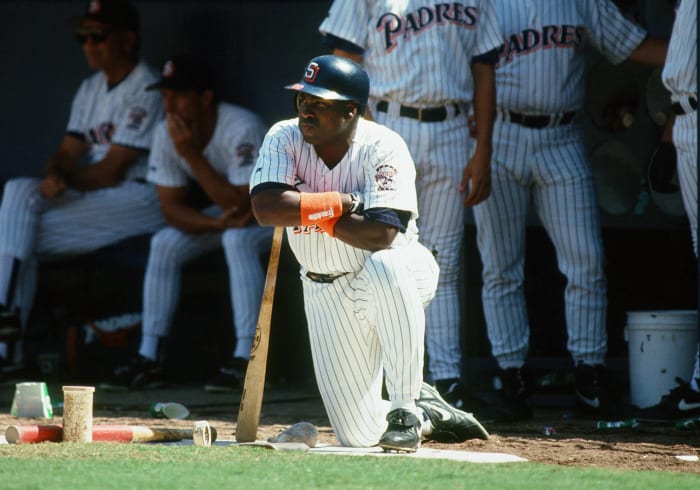
Philip Rivers had a successful NFL career, LaDainian Tomlinson is in the Hall of Fame and did most of his work in San Diego, and Junior Seau was a Chargers legend, but none of those men is San Diego’s signature athlete. That honor goes to Gwynn, one of the greatest pure hitters the game has ever seen. Gwynn’s .338 career batting average is good for 19th all time, and he won eight batting titles in his 20-year career. Gwynn mounted a serious charge at .400 during the strike-shortened 1994 season, finishing at .394 when the players walked out. That year was the first of four consecutive batting titles for Gwynn, who also had a three-peat earlier in his career. Gwynn led the league in hits seven times and struck out only 40 times in a season once. He finished only one season with a batting average under .300, and that was a year in which he played just 54 games. Oh, and he hit .289 that year, for what it’s worth. Gwynn was a 15-time All-Star and also won five Gold Gloves. He is the greatest pure hitter of this generation, and his career numbers against some of the game’s greatest pitchers are comically good. Gwynn never finished higher than third in MVP voting, owing to his lack of power and run production, but he is the greatest player in Padres history by a considerable margin.
Apologies to: Philip Rivers, LaDainian Tomlinson, Junior Seau, Dan Fouts, Kellen Winslow
SAN FRANCISCO: Jerry Rice

An argument exists that San Fran boasts the GOAT in two separate sports: Rice in football and Barry Bonds in baseball. Granted, it’s an argument that will cause some to howl with protest at the mere mention of Bonds’ name, but it is legitimate nonetheless. Still, while Bonds and others were great, Rice takes the crown. He is the all-time leader in receptions, receiving yards and receiving touchdowns, and second place isn’t particularly close in any of the categories. Rice was a first-team All-Pro 10 times, a league record he shares with the Raiders’ Jim Otto, won the 1987 Offensive Player of the Year award, and in that strike-shortened campaign he caught an astonishing 22 touchdowns in only 12 games. Rice led the league in touchdown catches six different times, went to the Pro Bowl as a member of the Niners 12 times and won three Super Bowls. Rice’s Super Bowl output with San Francisco makes it almost comical that he never won the game’s MVP Award. In three games he caught 28 passes for 512 yards and seven touchdowns. Never a fast receiver, even for his era, Rice was blessed with great hands, excellent route-running skills and the ability to get open against any defender. In 16 seasons with the 49ers, Rice failed to top 1,000 yards only three times when playing a full season, and one of those times was his rookie year. The other two came at ages 37 and 38.
Apologies to: Joe Montana, Ronnie Lott, Barry Bonds, Willie Mays, Steve Young, Juan Marichal, Willie McCovey, Buster Posey
SAN JOSE: Joe Thornton

Thornton was drafted first overall in 1997 by the Bruins, but it wasn’t until a midseason trade to San Jose in 2005-06 that his career really took off. Thornton blossomed with the Sharks and won the Hart Trophy that season. It was the first of three consecutive seasons as the league’s leading assist man for one of the game’s more unique talents. Despite his imposing physical stature, Thornton was at his best as a passer and was well-known as one of the nicest guys in the NHL. He was San Jose’s captain for four seasons but gracefully handled the “C” being shifted onto Joe Pavelski beginning in 2015-16. The Sharks have been one of the league’s most successful franchises for the last two decades but have never managed to win the Stanley Cup, only making it to the Final one time, where they were defeated by Pittsburgh. Thornton's fifteenth season with the Sharks was cut short by COVID-19, but along the way he became just the 14th player in league history to score 1,500 points. He retired after the 2021-22 season with 1,539 career points.
Apologies to: Patrick Marleau, Joe Pavelski, Brent Burns
SEATTLE: Ken Griffey Jr.
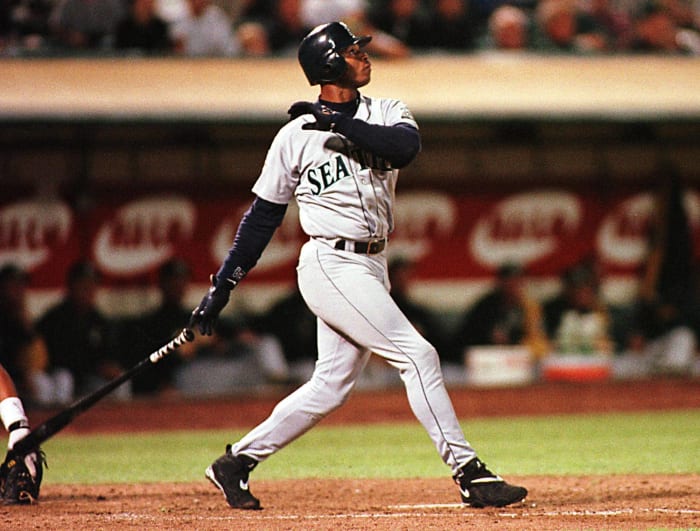
The Emerald City has been blessed with many athletes who, while not necessarily the best in their sports, have been unique, compelling talents. In the case of a few, though, like Griffey Jr., “best in their sport” was a fitting designation. “The Kid” was the most popular baseball player in the world for several years in the 1990s, and his swing, stance, mannerisms and backward hat were all emulated by youth baseball players across the country. Griffey was an instant success with the Mariners, and in his first stint with the team, spanning 11 seasons, he won an MVP Award, 10 Gold Gloves, an All-Star Game MVP and four home run crowns. Griffey was never dogged by steroid rumors like some of his contemporaries, which made his chase of Roger Maris’ record 61 home runs in 1997 and 1998 exciting for purists, both at the time and in retrospect. Griffey finished with 56 home runs in each season and won the RBI crown in 1997 as well. His swing is lauded for its smoothness and aesthetic appeal, and he patrolled centerfield with abandon, routinely making highlight reel catches. Griffey Jr. went into the Hall of Fame in 2016, receiving 437 of 440 votes. That gave him the distinction of having the highest percentage of votes in history, with 99.3, until Mariano Rivera went in as the Hall’s first unanimous selection in 2019.
Apologies to: Randy Johnson, Edgar Martinez, Shawn Kemp, Gary Payton, Felix Hernandez, Ichiro Suzuki, Steve Largent, Richard Sherman, Marshawn Lynch, Russell Wilson
TAMPA: Derrick Brooks

Tampa has had its share of iconic athletes despite being a one-team town for many years, and while there have been loud, colorful personalities, no athlete has been greater than Brooks. Ray Lewis received more publicity, as their careers ran more or less parallel to one another, but Brooks was very possibly his equal and maybe even better. He was the 2002 Defensive Player of the Year, a Super Bowl champion that same season and was a first-team All-Pro five times. Brooks went to 11 Pro Bowls, was the linchpin of the Buccaneers defense and went into the Hall of Fame in 2014. He never missed a game in his 14-year career, playing 224 consecutive contests and starting 208 consecutive games at weak side linebacker, an NFL record to this day. Brooks led the league in solo tackles on three separate occasions and was a terror in pass coverage, posting 25 career interceptions, including five in 2002, three of which he returned for touchdowns. Brooks also returned a fumble for a touchdown that season and is the only linebacker in NFL history with at least three interception return touchdowns and at least one fumble return touchdown in the same season.
Apologies to: John Lynch, Vincent Lecavalier, Martin St. Louis, Warrick Dunn, Warren Sapp, Lee Roy Selmon, Evan Longoria, Nikita Kucherov, Steven Stamkos
TORONTO: Roy Halladay

Was going to go with Mats Sundin here, but it feels lazy to just go with the best player of recent vintage for the city’s most popular team. Fact of the matter is, the Leafs have been more a cause for stress and disappointment than joy and civic pride. So instead, we’ll go with Halladay, who won the 2003 Cy Young with the Blue Jays and finished in the top five of Cy Young voting four other seasons with Toronto. One of the game’s best control pitchers, who also had plenty of velocity to his fastball and movement on his breaking ball, Halladay was virtually unhittable when he was on his game. In an era where bullpen use became more and more liberal, Halladay was a throwback, churning out 49 complete games in his 12 years in Toronto, 15 of them shutouts. Halladay was a six-time All-Star with the Jays and was able to thrive in the steroid-fueled home run era despite not being a strikeout machine. Though his most famous performance — a playoff no-hitter against Cincinnati — came with Philadelphia, the majority of Halladay’s best work was north of the border. Halladay was voted into the Hall of Fame in 2019.
Apologies to: Mats Sundin, Vince Carter, Tracy McGrady, Kyle Lowry, DeMar DeRozan, Kawhi Leonard, Joe Carter
VANCOUVER: Daniel and Henrik Sedin

Yes, technically the exercise here is to identify every major North American city’s signature athlete, not athletes. However, the Sedin twins are inseparable in just about every way. Daniel, a left wing, was the second pick in the 1999 NHL Draft and scored 1,041 points in 1,306 career games. Henrik, a center, was the third pick in the 1999 NHL Draft and scored 1,070 points in 1,330 career games. Henrik was more a setup man, with 830 career assists, Daniel the finisher, with 393 career goals. Henrik won the 2009-10 Hart Trophy, and Daniel finished second the following season. Each man won an Art Ross Trophy, and they did so in back-to-back years. Both were two-time All-Stars, and they were the engine behind Vancouver’s run to Game 7 of the 2011 Stanley Cup Final, where they fell to the Boston Bruins. Roberto Luongo was the other integral member of the best Vancouver teams, but everything good that the Canucks did started with the Sedins. It’s only fitting that they be co-signature athletes for the city.
Apologies to: Roberto Luongo, Markus Naslund, Trevor Linden, Pavel Bure
WASHINGTON: Alexander Ovechkin

Wes Unseld or Elvin Hayes? Great players, but uninspired. John Wall? Pass. Bryce Harper? One truly great season, lots of hype; no titles. Anyone on the Commanders? No one rises above the rest for that franchise. Is it ironic that D.C.’s signature athlete is Russian? Either way, Ovechkin richly deserves the honor, as he won the Conn Smythe after leading the Capitals to the 2018 Stanley Cup. That victory was the capstone for a career chock full of individual honors. Ovechkin has three Hart Trophies, nine Rocket Richard Trophies, an Art Ross Trophy and the 2005-06 Calder Trophy. He is a 12-time All-Star, and unquestionably the best pure goal scorer of his generation, and probably ever. Ovechkin plays with a reckless abandon that makes opposing fans hate him, but Capitals fans adore him all the more. Nothing is scarier for an opposing team than Ovechkin charging up the wing with a head of steam or hanging out in the left circle on the power play just waiting for a one-time opportunity. Ovechkin has 830 career goals, and though his production is flagging badly this season, he still has a chance at challenging Wayne Gretzky's all-time record.
Apologies to: Joe Theismann, Darrell Green, Art Monk, Wes Unseld, Elvin Hayes, Bryce Harper, Stephen Strasburg, Joe Jacoby, Russ Grimm
Chris Mueller is the co-host of The PM Team with Poni & Mueller on Pittsburgh's 93.7 The Fan, Monday-Friday from 2-6 p.m. ET. Owner of a dog with a Napoleon complex, consumer of beer, cooker of chili, closet Cleveland Browns fan. On Twitter at @ChrisMuellerPGH – please laugh.
More must-reads:
- One-on-One: Is Patriots' Tom Brady done after 2019?
- Magic Johnson: Career retrospective
- The 'No. 1 overall NFL Draft picks' quiz
Breaking News
Customize Your Newsletter
 +
+
Get the latest news and rumors, customized to your favorite sports and teams. Emailed daily. Always free!
Use of this website (including any and all parts and
components) constitutes your acceptance of these
Terms of Service and Privacy Policy.

